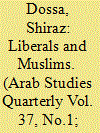| Srl | Item |
| 1 |
ID:
145624


|
|
|
|
|
| Summary/Abstract |
The article analyzes the democratic transitions in Tunisia and Egypt, after the so-called “Arab Spring.” The working hypothesis is that the model of transition influences the result of democratization processes. The article is organized in three sections. The first one puts forward a theoretical and methodological framework, which includes a definition and classification of political regimes, a typology of the processes of political change and suggests models of democratic transition. Second, the models of transition in Tunisia and Egypt are compared in terms of four analytical dimensions: leadership of the transition, competition and interaction between political actors, consensus over the transition process, and the popular mobilization and the participation of the civil society. The third section assesses the outcomes of the research and concludes that the exclusion of political forces and the intervention of non-accountable actors can determine the result of democratic transitions (Egypt). In contrast, the agreements between political actors and the concessions of a predominant party can bring about a successful transition, even in a polarized scenario (Tunisia).
|
|
|
|
|
|
|
|
|
|
|
|
|
|
|
|
| 2 |
ID:
145621


|
|
|
|
|
| Summary/Abstract |
This article examines the process of development of the political left since its inception in Turkey in a context when the republic was established as a nation state and 1917 October Revolution. It looks at how the movement has been transformed with the collapse of the Soviet Union and with the changes in domestic politics. The historical process of the Turkish left is divided into three eras: The first from the beginning of the republic to the 1960s; the second from 1960 to 1980; and the third from 1980 to the present day. In this era, the left has not had that organized structure and influence as in the second era.
|
|
|
|
|
|
|
|
|
|
|
|
|
|
|
|
| 3 |
ID:
145623


|
|
|
|
|
| Summary/Abstract |
The liberal claim to decency is flimsy. In fact, the liberal norm is indecency. The Muslim case is symptomatic of this reality. The suffering of Muslims is extensive in liberal locales. The threat to Muslim security is intrinsic in liberal theory. It is the liberal genre of exclusion. In this article, I unravel anti-Muslim antipathy in Kant, Mill, and Montesquieu (KMM). I dissect their specious claims about the Muslims and the Orient. I stress KMM's formative influence on liberal academe. I conclude with the criticism of liberal Jewish attacks on Muslims/Arabs/Palestinians.
|
|
|
|
|
|
|
|
|
|
|
|
|
|
|
|
| 4 |
ID:
145622


|
|
|
|
|
| Summary/Abstract |
This investigation identifies the different elements in Bahraini society and government that indicate the existence of authoritarian rule and the mechanisms which perpetuate it. Hardliners in the royal family have strategically obstructed democratization in the country by controlling Bahrain's ideological and coercive state apparatus. The ideological apparatus encourages public disavowal of political reform and marginalizing Bahrain's Shī'ī heritage. The coercive state apparatus regularly punishes, imprisons, and physically abuses political activists and those who are suspected of encouraging civil unrest. Bahrain's alliance with Saudi Arabia has encouraged hardliners in the government to particularly promote anti-Shī'ī agendas that stigmatize, disenfranchise, and repress the majority of its citizens. Representatives of the Bahraini government have consistently accused Iran of providing logistical support to Bahraini activists. However, evidence suggests the claims of Iranian involvement in the 2011 demonstrations or an alleged coup attempt in 1981 to be false. Finally, this article identifies developments in 2011, both inside and outside of the country, that encouraged the reduction of repression of its citizens.
|
|
|
|
|
|
|
|
|
|
|
|
|
|
|
|